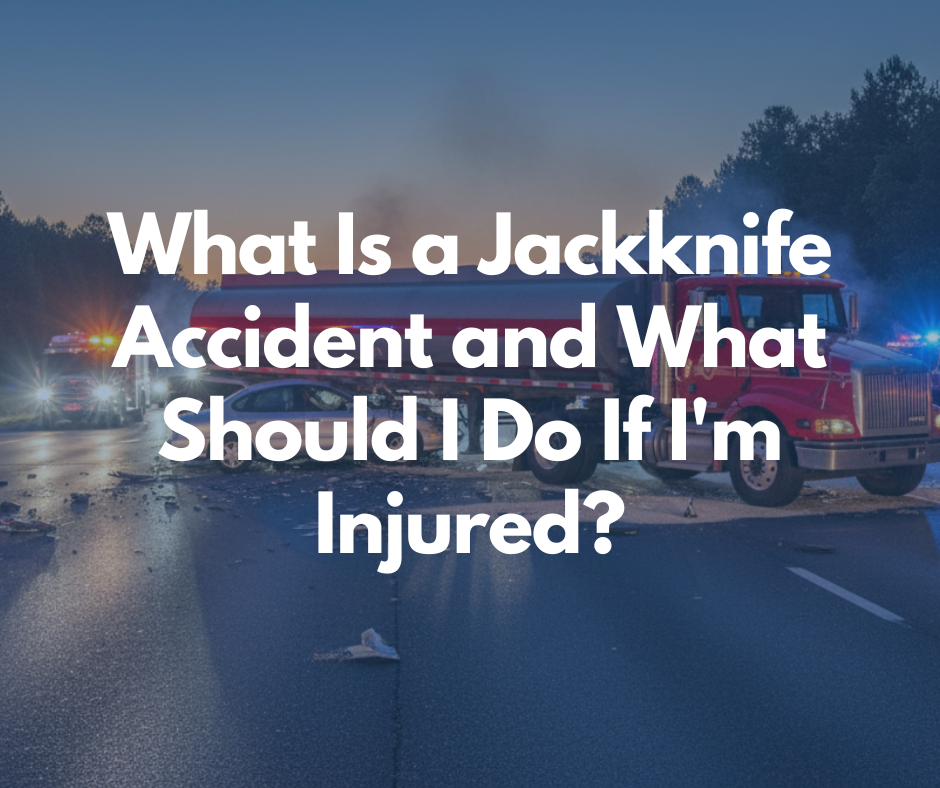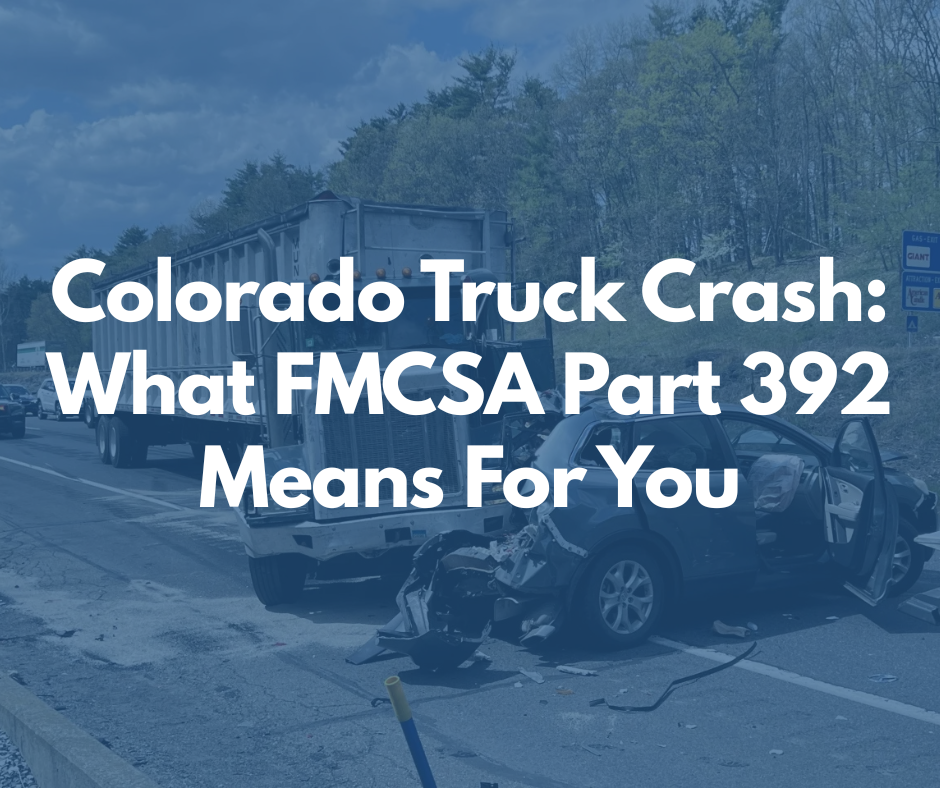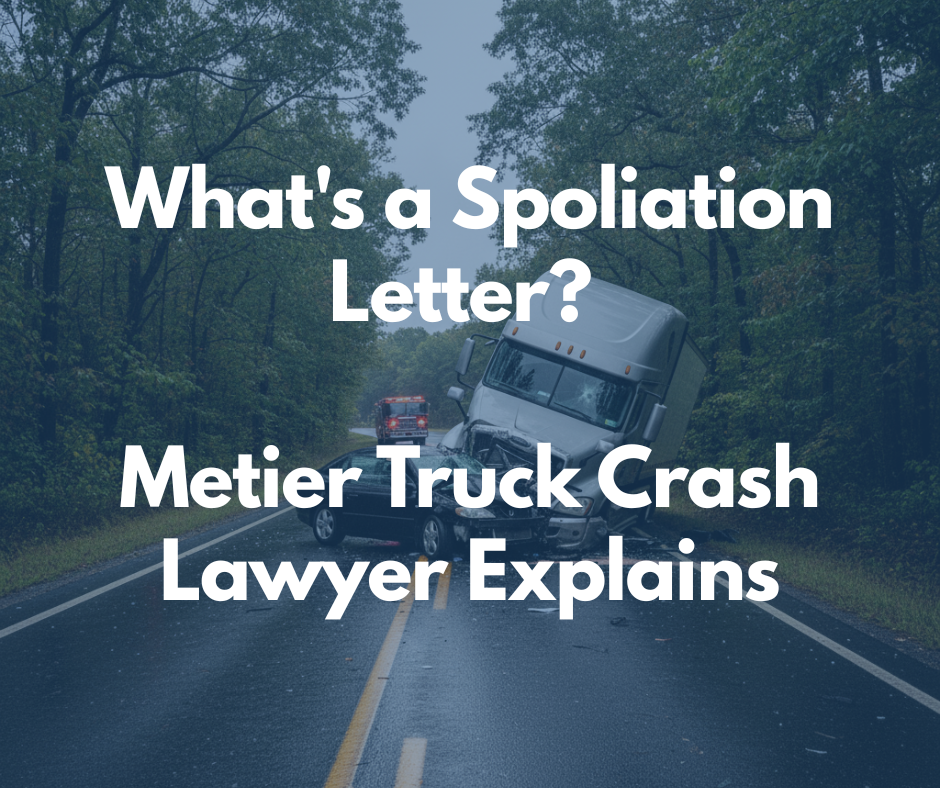
Key Points In This Article:
- Jackknife accidents happen when a truck's trailer swings out to form a 90-degree angle or less with the cab
- Common causes include sudden braking, speeding, poor road conditions, and equipment failure
- Multiple parties may be liable including the driver, trucking company, or maintenance providers
- Document everything at the scene and seek medical attention immediately, even for minor symptoms
- An experienced truck accident attorney can investigate complex liability issues and secure full compensation
- Federal trucking regulations play a crucial role in determining fault and negligence
A jackknife accident occurs when a semi truck's trailer swings out at a dangerous angle to the cab, forming a sharp V-shape that resembles a folding pocket knife. "In my 18-plus years as a personal injury and truck accident lawyer, I've seen how jackknife accidents can turn a normal highway into a disaster zone in seconds," says Mike Chaloupka, Managing Partner at Metier Law Firm. "Having my CDL gives me insight into exactly what goes wrong in these crashes. These accidents don't just affect one vehicle, they can sweep across multiple lanes and involve dozens of cars before anyone has time to react." When a massive 80,000-pound semi truck loses control and jackknifes across the highway, the results are catastrophic for everyone in its path.
What Is a Jackknife Accident?

A semi truck jackknife accident happens when the trailer portion of an 18-wheeler swings outward while the cab continues forward, creating an angle that looks like a folding knife blade. This dangerous situation occurs when the drive wheels lock up but the trailer keeps moving forward with momentum. The physics are simple but deadly. Once that trailer starts swinging, the driver has almost no control over where it goes.
Think about the sheer mass involved here. A fully loaded semi truck can weigh up to 80,000 pounds, and when that weight starts sliding sideways across multiple lanes of traffic, vehicles in its path have nowhere to go. The trailer becomes a massive wall blocking the roadway, and the cab might end up facing completely backward. We've handled cases where the entire interstate was shut down for hours because one truck jackknifed across all lanes.
The term comes from the resemblance to a folding pocket knife, where the blade folds into the handle at a sharp angle. In trucking terms, any angle less than 90 degrees between the cab and trailer qualifies as a jackknife position. Once a truck reaches this point, recovery is nearly impossible without coming to a complete stop.
Common Causes of Jackknife Accidents
Understanding why these crashes happen helps us build stronger cases for our clients. Sudden braking tops the list of causes. When a truck driver slams on the brakes, especially on wet or icy roads, the trailer's momentum can push it sideways. We see this frequently when drivers are speeding and encounter unexpected traffic or obstacles.
Weather conditions play a huge role in jackknife accidents. Rain, snow, ice, and even strong winds can trigger these crashes. According to the Federal Motor Carrier Safety Administration, weather is a factor in approximately 13% of all large truck crashes. Trucking companies know these risks, yet they often pressure drivers to meet deadlines regardless of conditions.
Equipment failure is another major factor we investigate. Worn brake pads, faulty brake systems, improperly maintained tires, or malfunctioning anti-lock braking systems can all lead to jackknifing. Federal regulations require regular inspections and maintenance, but companies cutting corners to save money put everyone at risk.
Driver error rounds out the primary causes. This includes following too closely, taking curves too fast, improper loading that affects weight distribution, and driver fatigue. The National Highway Traffic Safety Administration reports that driver-related factors are present in about 87% of critical reasons for crashes involving large trucks.
Why Jackknife Accidents Are So Dangerous
The danger of a semi truck jackknife accident extends far beyond the initial loss of control. When a trailer swings out, it can sweep across multiple lanes like a giant broom, collecting vehicles in its path. Cars get crushed against barriers, pushed into other vehicles, or trapped underneath the trailer. We've seen cases where a single jackknife event caused a chain reaction involving 20 or more vehicles.
The speed differential makes these crashes particularly deadly. Highway traffic moves at 65-75 mph, and when a jackknifed truck suddenly blocks the road, following vehicles have mere seconds to react. Smaller vehicles don't stand a chance against 40 tons of steel. The height difference means cars can slide under trailers, causing devastating roof crush injuries.
Secondary accidents often prove just as dangerous as the initial crash. Vehicles swerving to avoid the jackknifed truck collide with other cars, barriers, or leave the roadway entirely. In poor visibility conditions, drivers might not see the sideways trailer until it's too late. These pile-ups can stretch for miles and involve hundreds of vehicles.
If you or a loved one was injured in a crash with a commercial truck, call us at 866-377-3800 or schedule a free consultation at www.metierlaw.com.
Who Is Liable in a Jackknife Truck Accident?

Determining liability in these crashes requires thorough investigation and understanding of federal trucking regulations. The truck driver might be liable if they were speeding, driving recklessly, or violated hours-of-service rules. But liability often extends beyond the person behind the wheel.
Trucking companies frequently share responsibility. They might have pushed drivers to meet unrealistic deadlines, failed to properly train drivers, or ignored maintenance schedules. We examine hiring practices, training records, and company policies. If a company hired a driver with a poor safety record or substance abuse issues, they can be held accountable for negligent hiring.
Third-party maintenance providers and cargo loading companies can also be liable. Improper loading that shifts during transport can trigger a jackknife. Maintenance companies that performed substandard brake repairs or tire replacements may share fault. Even manufacturers of defective truck parts might bear responsibility.
Government entities occasionally share liability when road design or maintenance contributes to the accident. Inadequate signage, poorly designed curves, or failure to treat icy roads can all be factors. We leave no stone unturned when investigating who should be held accountable for your injuries.
Steps to Take After a Jackknife Accident
Your actions immediately after a semi truck accident can significantly impact your ability to recover compensation. First, get to safety if you can move. These accident scenes are chaotic and dangerous, with fuel spills, debris, and potential secondary crashes. Call 911 immediately to get medical help and law enforcement on scene.
Document everything possible. Take photos of vehicle positions, skid marks, weather conditions, and your injuries. Get contact information from witnesses before they leave. Many jackknife accidents happen so fast that witness testimony becomes crucial for establishing what really happened. Record the truck's DOT number, company name, and license plate.
Seek medical attention even if you feel fine. Adrenaline masks pain, and some injuries like internal bleeding or traumatic brain injuries don't show immediate symptoms. Having medical records from immediately after the crash strengthens your case and ensures you get necessary treatment. Keep all medical records, bills, and documentation of missed work.
Never admit fault or discuss the accident with insurance adjusters without legal representation. Insurance companies start working immediately to minimize their payout. They might record your statements and use them against you later. Let your attorney handle all communication with insurance companies and the trucking company's legal team.
How a Truck Accident Lawyer Can Help You Recover Compensation
.png)
Semi truck jackknife accidents involve complex liability issues and multiple insurance policies. We know how to navigate these complexities because we understand trucking from both legal and practical perspectives. Our investigation goes beyond the police report, often uncovering violations of Federal Motor Carrier Safety Regulations that strengthen your case.
We work with accident reconstruction experts who can determine exactly how the jackknife occurred and who bears responsibility. These experts analyze skid marks, vehicle damage, and electronic logging device data to recreate the crash. This technical evidence often proves critical in negotiations or trial.
Insurance companies know that 18-wheeler accident cases can result in massive verdicts, so they fight hard to minimize payouts. They might offer quick settlements that seem substantial but don't cover long-term medical costs, lost earning capacity, or pain and suffering. We calculate the true value of your claim, including future medical needs and the full impact on your life.
Our team handles all aspects of your case while you focus on recovery. We deal with insurance adjusters, gather evidence, interview witnesses, obtain truck maintenance records, review driver logs, and build a compelling case for maximum compensation. Having an attorney with CDL knowledge means we understand the technical aspects of trucking that other lawyers might miss.
Talk to a Trusted Truck Accident Lawyer Today
Jackknife accidents leave victims facing mounting medical bills, lost wages, and long-term disabilities. You need an attorney who understands both the devastating impact of these crashes and the complex regulations governing the trucking industry. At Metier Law Firm, we combine legal expertise with real-world trucking knowledge to fight for the compensation you deserve.
Don't let the trucking company's insurance team minimize your claim or pressure you into accepting less than you need. We know their tactics and how to counter them. Our track record speaks for itself, with millions recovered for truck accident victims across Colorado, Wyoming, Oregon, and Washington. Call Metier Law Firm at 866-377-3800 or schedule your free consultation today at www.metierlaw.com.
FAQ
How long do I have to file a lawsuit after a semi truck jackknife accident?
Each state has different statutes of limitations for personal injury claims. In Colorado and Wyoming, you generally have three years from the accident date. Oregon gives you two years, while Washington provides three years. However, claims against government entities often have much shorter deadlines, sometimes just months. Don't wait to contact an attorney, as evidence disappears quickly and witnesses become harder to locate over time.
What compensation can I receive after a jackknife truck accident?
Victims of semi truck accidents can recover compensation for medical expenses, lost wages, future earning capacity, pain and suffering, property damage, and loss of enjoyment of life. In cases involving gross negligence, such as drunk driving or falsified logbooks, punitive damages might also be available. Every case is unique, but these crashes often result in substantial settlements or verdicts due to the severe injuries involved.
How common are jackknife accidents compared to other truck crashes?
Jackknife accidents represent about 5% of all truck-involved crashes according to federal data, but they account for a disproportionate number of fatalities and serious injuries. The multi-vehicle nature of these crashes and the inability of other drivers to avoid them make jackknifes particularly deadly. Weather-related jackknifes spike during winter months, especially in mountainous regions where we practice.
Will my case go to trial or settle out of court?
Most semi truck jackknife accident cases settle before trial, but we prepare every case as if it will go before a jury. Trucking companies and their insurers often prefer to settle when faced with strong evidence of negligence. However, if they won't offer fair compensation, we're ready to take your case to trial. Our reputation for winning at trial often motivates better settlement offers.
Can I still recover compensation if I was partially at fault?
Yes, in most cases. Colorado, Wyoming, Oregon, and Washington all follow modified comparative negligence rules. As long as you're less than 50% or 51% at fault (depending on the state), you can still recover damages, though your compensation will be reduced by your percentage of fault. We work to minimize any fault assigned to you and maximize the trucking company's liability.
Disclaimer: Past results discussed should not be considered a guarantee of your results as the factors of every case are individually unique. This content is for informational purposes only and does not constitute legal advice. Consult a qualified attorney from Metier Law Firm regarding your individual situation for legal advice.
Tell Us About Your Case – Free Case Review with a Truck Accident Lawyer
Tell Us About Your Case – Free Case Review with a Personal Injury Lawyer
(866) 377-3800Our Locations
.webp)
Do I have a Case?
How Much Should I Be Offered?
Do I Need an Attorney?
If these questions have crossed your mind, let us help. You may need a little direction or may not need an attorney at all, but you deserve to be confident knowing your options. We can provide you with information about our Attorneys of the West® accident investigations and legal services. Your confidential consultation with us is totally free.
Keep up with us!

.svg)




